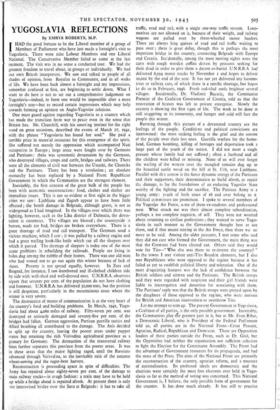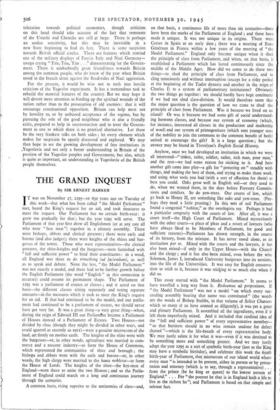YUGOSLAVIA REFLECTIONS
By EMRYS ROBERTS, M.P.
I HAD the good fortune to be the Liberal member of a group of 1 Members of Parliament wbo have just made a fortnight's visit to Yugoslavia. There were nine Labour Members and one Liberal National The Conservative Member failed to come at the last moment. The visit was in no sense a conducted tour. We had the greatest freedom to travel about, in groups or individually. We had our own British interpreters. We saw and talked to people of all shades of opinion, from Royalist to Communist, and in all walks of life. We have been back almost a fortnight and my impressions, somewhat confused at first, are beginning to settle down. What I want to do, here is not to set out a comprehensive judgement on Yugoslavia—indeed, to form one would be impossible after a mere fortnight's stay—but to record certain impressions which may help towards forming an opinion on Anglo-Yugoslav relations.
One must guard against regarding Yugoslavia as a country which has made the transition frcm war to peace even in the sense that Britain has. Mr. Churchill, with his unerring instinct for the right word on great occasions, described the events of March 27, 1941, with the phrase "Yugoslavia has found her soul." She paid a terrible price in material resources for this resurgence of the spirit. She suffered not merely the oppression which accompanied Nazi occupation in Europe ; large areas were fought over by Germans and Partisans: there was systematic devastation by the Germans, who destroyed villages, crops and cattle, bridges and railways. There were all the elements of civil war between the Ustashi, the Chetniks and the Partisans. There has been a revolution ; an absolute monarchy has been replaced by a National Front Republican Government in which the Ccrrununists are the strongest element.
Inevitably, the first ccncern of the great bulk of the people has been with economic reconstruction: food, clothes and shelter are immediate issues. This is not so evident at first sight in the bigger cities we saw: Ljubljana and Zagreb appear to have been little affected ; the bomb damage in Belgrade, although grave, is not as widespread as I had imagined. In the villages over which there was fighting, however, such as the Lika district of Dalmatia, the devas- tation is enormous. The villages are blasted ; the countryside is barren, roads are bad, bridges are broken everywhere. There is a great shortage of road and rail transport. The Germans used a vicious machine, which I saw ; it was pulled by a railway engine and had a great trailing hook-like knife which cut all the sleepers over which it passed. The shortage of sleepers is today one of the most acute problems in rebuilding the railroads. People are living in holes dug among the rubble of their homes. There was one old man who had vowed not to go out again this winter because of lack of shoes. Poverty is not spread equally, however. In Zara and Biograd, for instance, I saw .barefooted and ill-clothed children side by side with well-shod and well-dressed ones. U.N.R.R.A. observers report that seventy per cent, of the population do not have clothing and footwear. U.N.R.R.A; has delivered 32,000 tons, but the position is still desperate, particularly in the mountainous areas where the winter is very severe.
The destruction of means of communication is at the very heart of the country's food and building problems. In March, 1941, Yugo- slavia had about 4,060 miles of railway. Fifty-seven per cent, was destroyed or seriously damaged and seventy-five per cent. of the bridges had fallen. German aggression, Partisan guerilla tactics and Allied bombing all contributed to the damage. The Axis decided to split up the country, leaving the poorer areas under puppet states but retaining the rich Voivodina agricultural province as a granary for Germany. The destruction of the transversal railway lines further separates this province from the poorer areas. It was in these areas that the major fighting raged, until the Russians advanced through Voivcdina, to the inevitable ruin of the autumn wheat-sowing and the sugar-beet harvest.
Reconstruction is proceeding apace in spite of difficulties. The Army has repaired about eighty-seven per cent, of the damage to main railway tracks—in rough fashion: a train may have to be held up while a bridge ahead is repaired afresh. At present there is only one improvised bridge over the Sava at Belgrade: it has to take all traffic, road and rail, with a single one-way traffic system. Loco- motives are not allowed on it, because of their weight, and railway wagons are pulled over by three-wheeled motor haulers. There are always long queues of road and rail traffic waiting to pass over ; there is great delay, though this is perhaps the most important bridge in the country, connecting Belgrade with Europe and Croatia. Incidentally, among the most moving sights were the carts with rough wooden coffins driven by peasants seeking for their dead in order to give them a decent re-burial U.N.R.R.A had delivered 6,594 motor trucks by November x and hopes to deliver to,000 by the end of the year.' It has not yet delivered any locomo- tives or railway cars, of which there is a terrific shortage, but hopes to do so in February, 1946. Fresh red-tiled roofs brighten several villages. Incidentally, Dr. Vladimir .Bucaric, the Communist Premier of the Coalition Government of Croatia, told us that the restoration of hcuses was left to private enterprise. Slowly the country is showing the first signs of life. The work to be done is still staggering in its immensity, and hunger and cold will face the people this winter.
Running through this picture of a devastated country are the feelings of the people. Conditions and political convictions are intertwined: the most striking feeling is the grief and the sorrow ot the people over their lost ones. Guerilla warfare for the home- land, German bombing, killing of hostages and deportation took a large part of the youth of the nation. I did not meet a single peasant whose family had not suffered ; often a ,husband and all the children were killed or missing. None of us will ever forget the wailing of the women over the mangled remains dug up in the beautiful sunlit wood on the hill at St. Urh, near Ljubljana. Parallel with this sorrow is the fierce dynamic energy of the Partisans and their supporters, their determination to build afresh, to repair the damage, to lay the foundations of an enduring Yugoslav State worthy of the fighting and the sacrifice. The Partisan Army is a young army : youth of both sexes of x6 and over belong to a. Political commissars are prominent. I spoke to several members of the Yugoslav Air Force, sc me of them ex-students and professional men. What struck me was their almost complete subordination, perhaps a too complete negation, of self. They were not worried about returning to civilian professions ; they wanted to serve Yugo- slavia in such manner as the Government thought best to use them, and if that meant staying in the Air Force, then there ww no more to be said. Among the older peasants, I met some who said they did not care who formed the Government, the main thing was that the Germans had been cleared out. Others said they would vote for Tito—" Who else was there to re-instate the country? " In the towns I met violent anti-Tito Royalist elements, but I also met Republicans who were opposed to the regime because it has failed as yet to establish political liberty and toleration. One of the most disquieting features was the lack of confidence between the British soldiers and airmen and the Partisans. The British troops said they were regarded with suspicion and their girl friends were liable to interrogaticn and detention for associating with them. The Partisans' reply was that the British troops were preyed upon by the daughters of those opposed to the regime, who were anxious for British and American intervention to overthrow Tito.
Let me attempt to sum up. The present Government in Yugoslavia, a Coalition of all parties, is the only possible government. Inevitably, the Communists play tfie greatest part in it, but as Mr. Evan Ribar, a Democratic Liberal, who is President of the Federal Parliament told us, all parties are in the National Front—Croat Peasant, Agrarian, Radical, Republican and Democrat. There are Opposition leaders of these parties outside the Front, such as Dr. Grol, but the Opposition had neither the organisation nor sufficient cohesion to fight the Election for the Constituent Assembly. The Front had the advantage of Government resources for its propaganda, and had the mass of the Press. The aims of the National Front arc primarily the reconstruction of the country, agrarian reform, and a measure of nationalisation. Its professed ideals are democratic and the elections were certainly the most free elections ever held in Yugo- slavia so far as the method of voting was concerned. This National Government is, I believe, the only possible form of government for the country. It has done much already. It. has still to practise toleration towards political economics, though criticism on this head should take account of the fact that remnants of the Ustashi and Chetniks are still at large. There is perhaps an undue sensitivity, but this may be inevitable in a new State beginning to find its feet. There is some suspicion towards British official circles. There are features which remind one of the military displays of Fascist Italy and Nazi Germany— troops crying "Tito, Tito, Tito . .." demonstrating for the Govern- ment. There is undoubtedly great friendliness towards Britain among the common people, who do know of the year when Britain stood in the breach alone against the flood-tides of Nazi aggression.
For the present, it would be wise not to rush into hostile criticism of the Yugoslav experiment. It has a tremendous task to rebuild the material features of the country. But we may hope it will devote more attention to binding up the spiritual wounds of the nation rather than to the prosecution of old enemies: that it will encourage constitutional opposition. Britain can help most not by hostility to, or by unbiased acceptance of the regime, but by pursuing the role of the good neighbour who is also a friendly critic, prepared to help in reconstruction and to treat the Govern- ment as one to which there is no practical alternative. Let there be the very frankest talks on both sides ; let every element which makes for suspicion be openly discussed and explored. We may then hope to see the growing development of free institutions in _Yugoslavia and not only a better understanding in Britain of the position of the Yugoslav peoples and Government, but also, which is quite as important, an understanding in Yugoslavia of the British people themselves.































 Previous page
Previous page